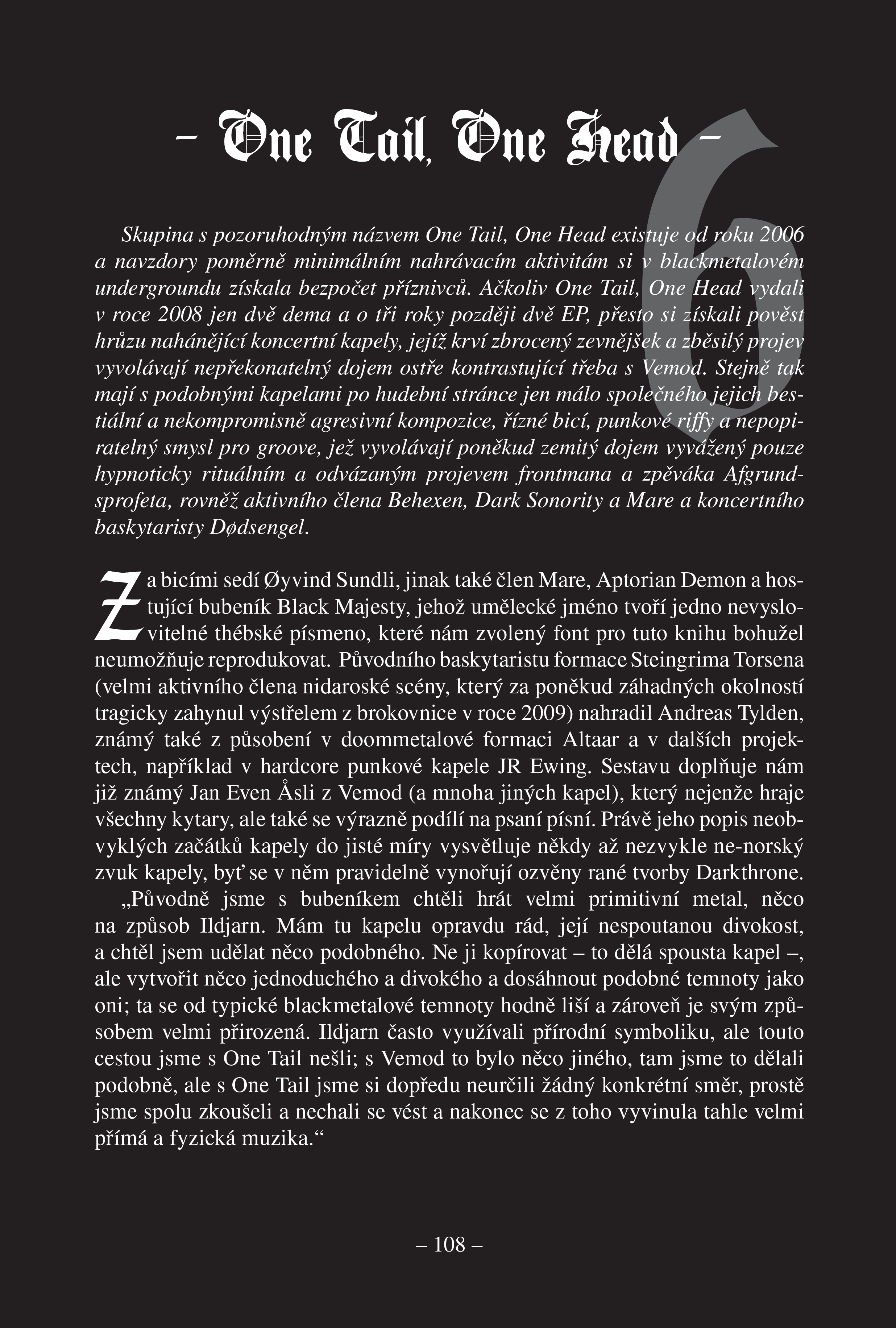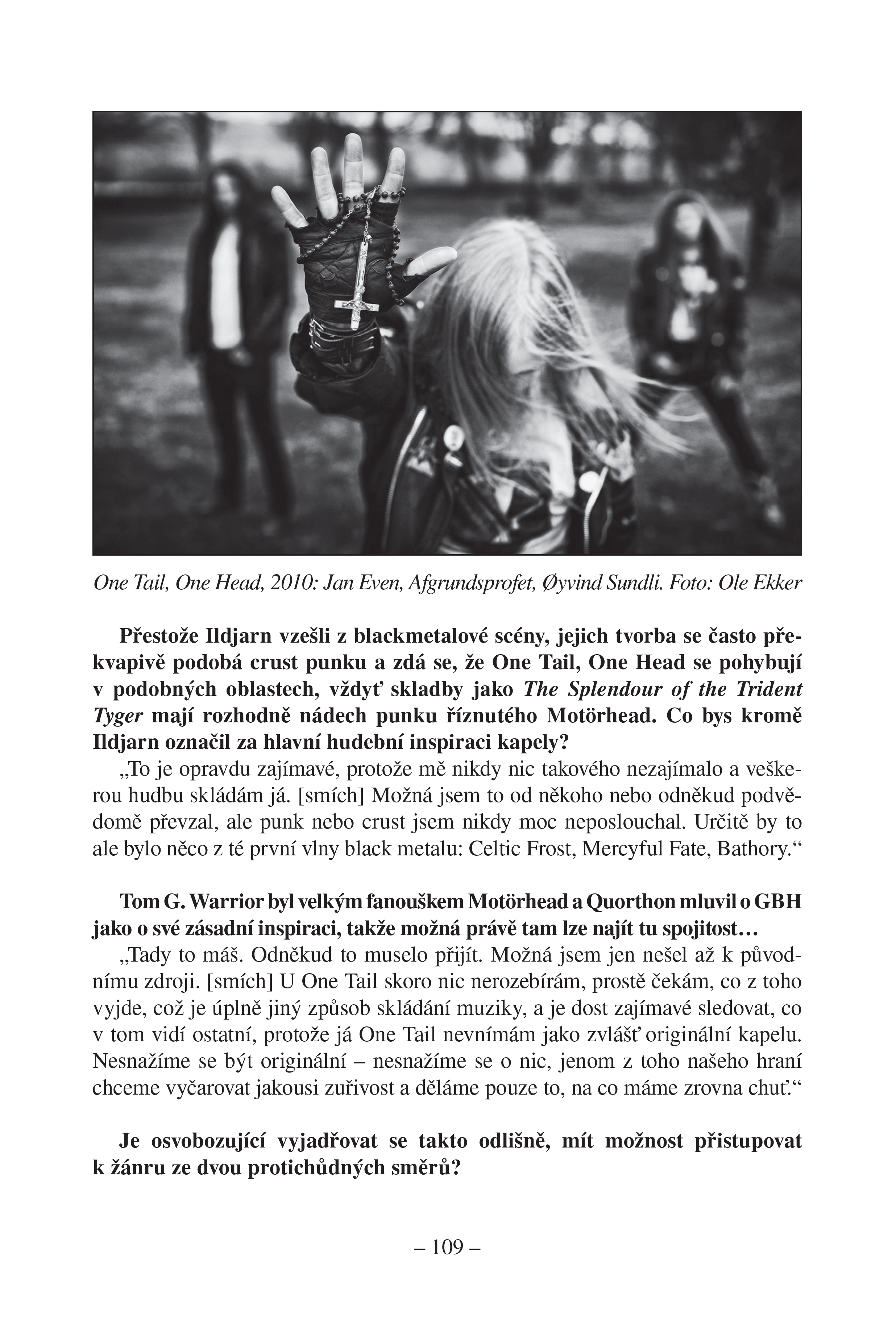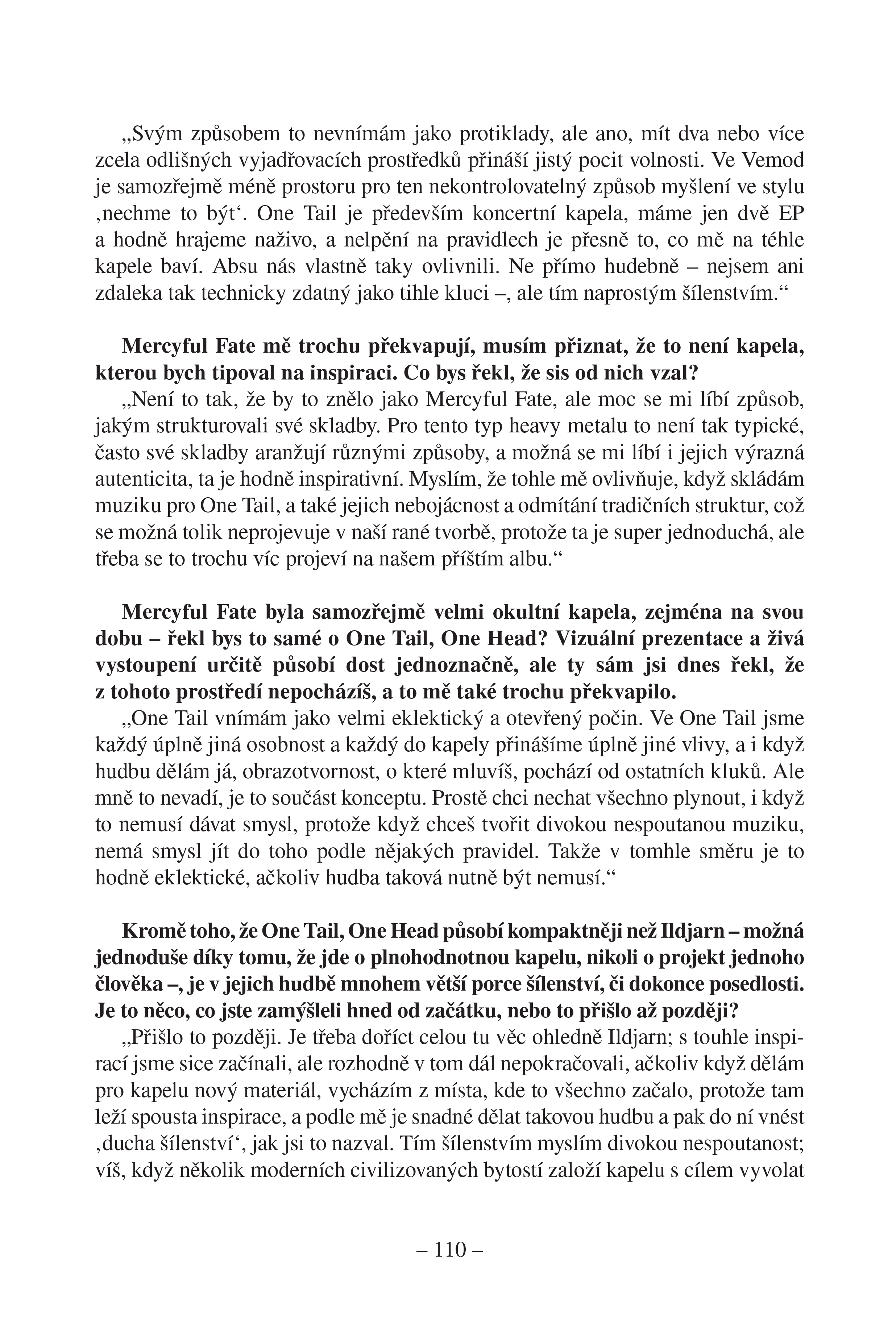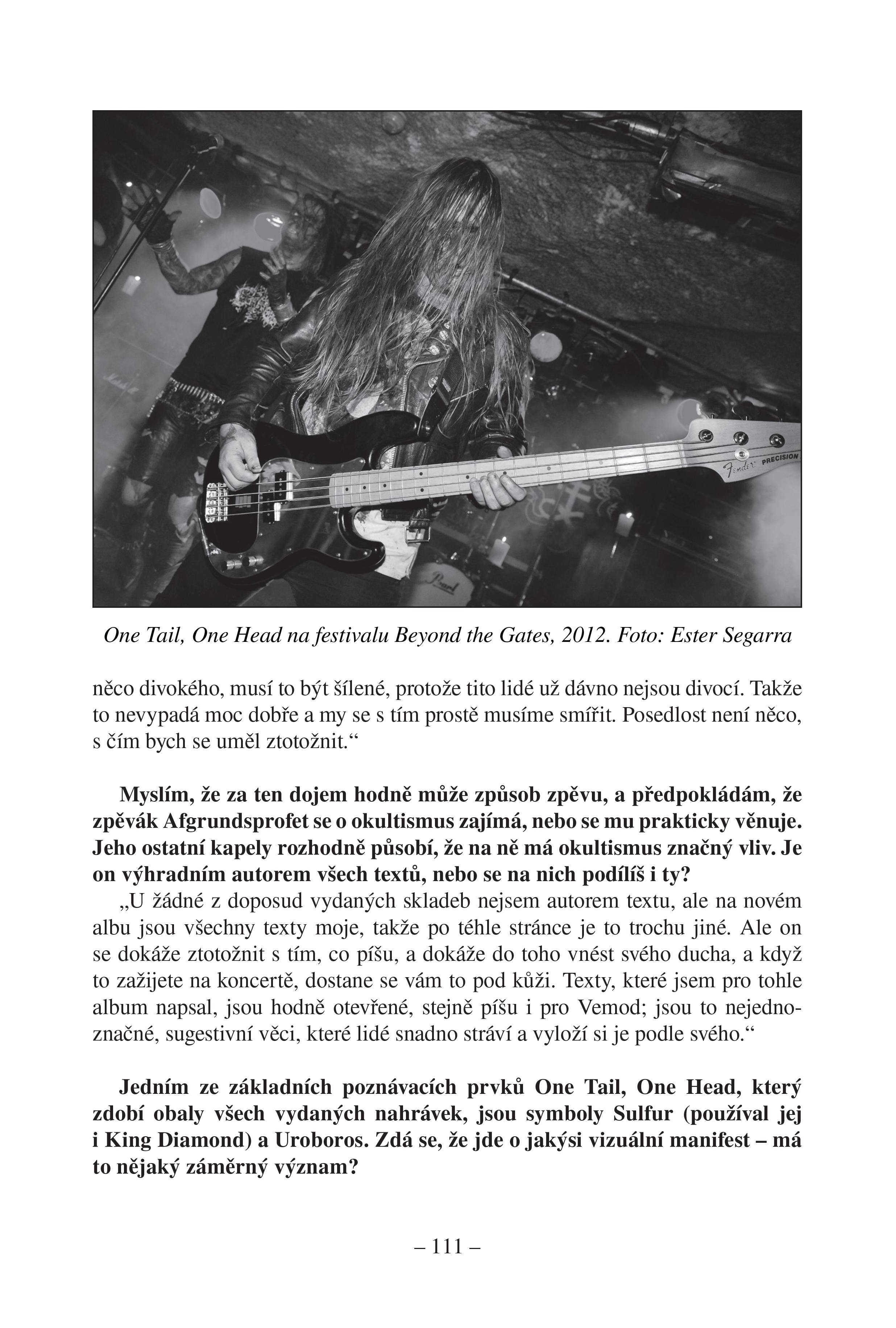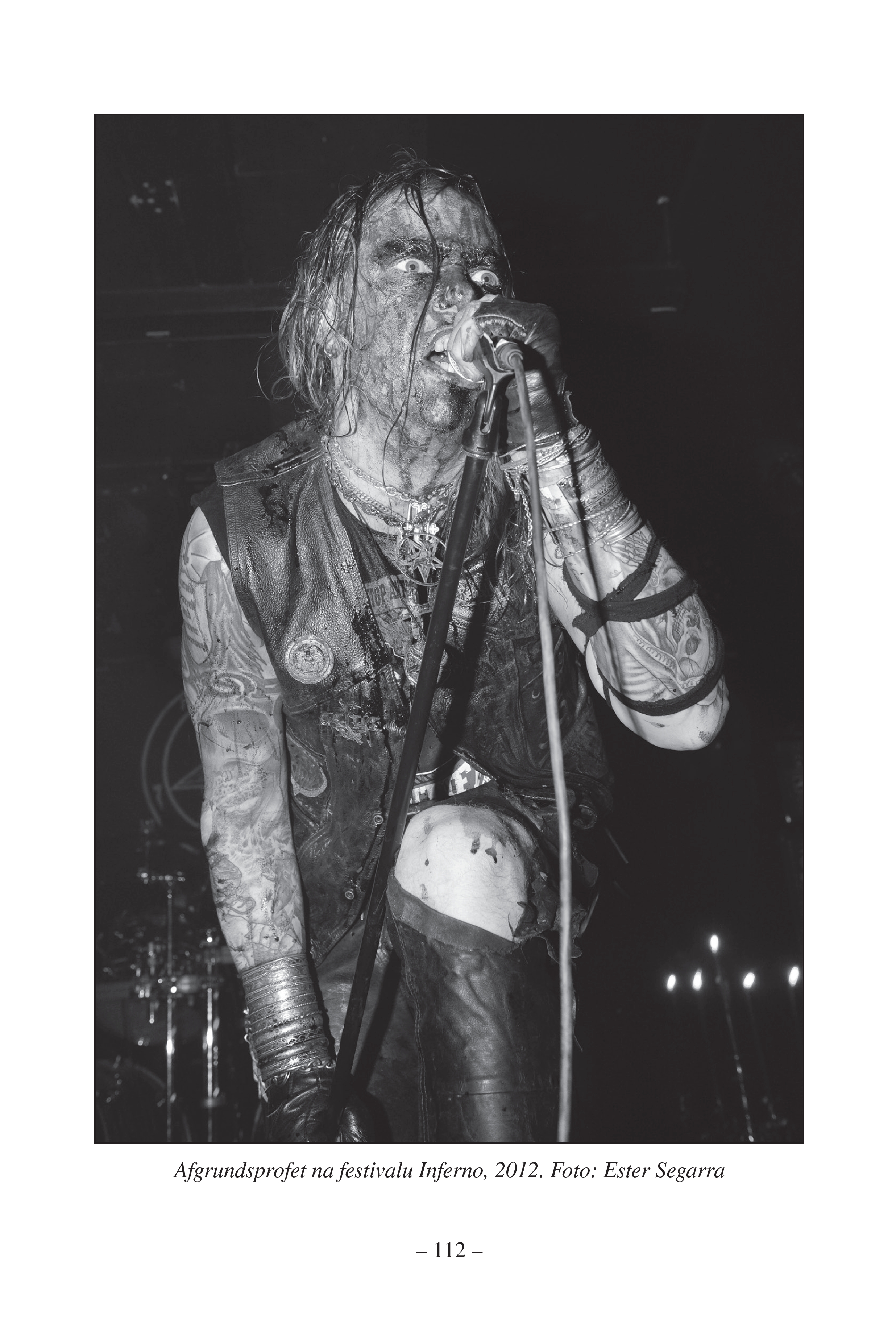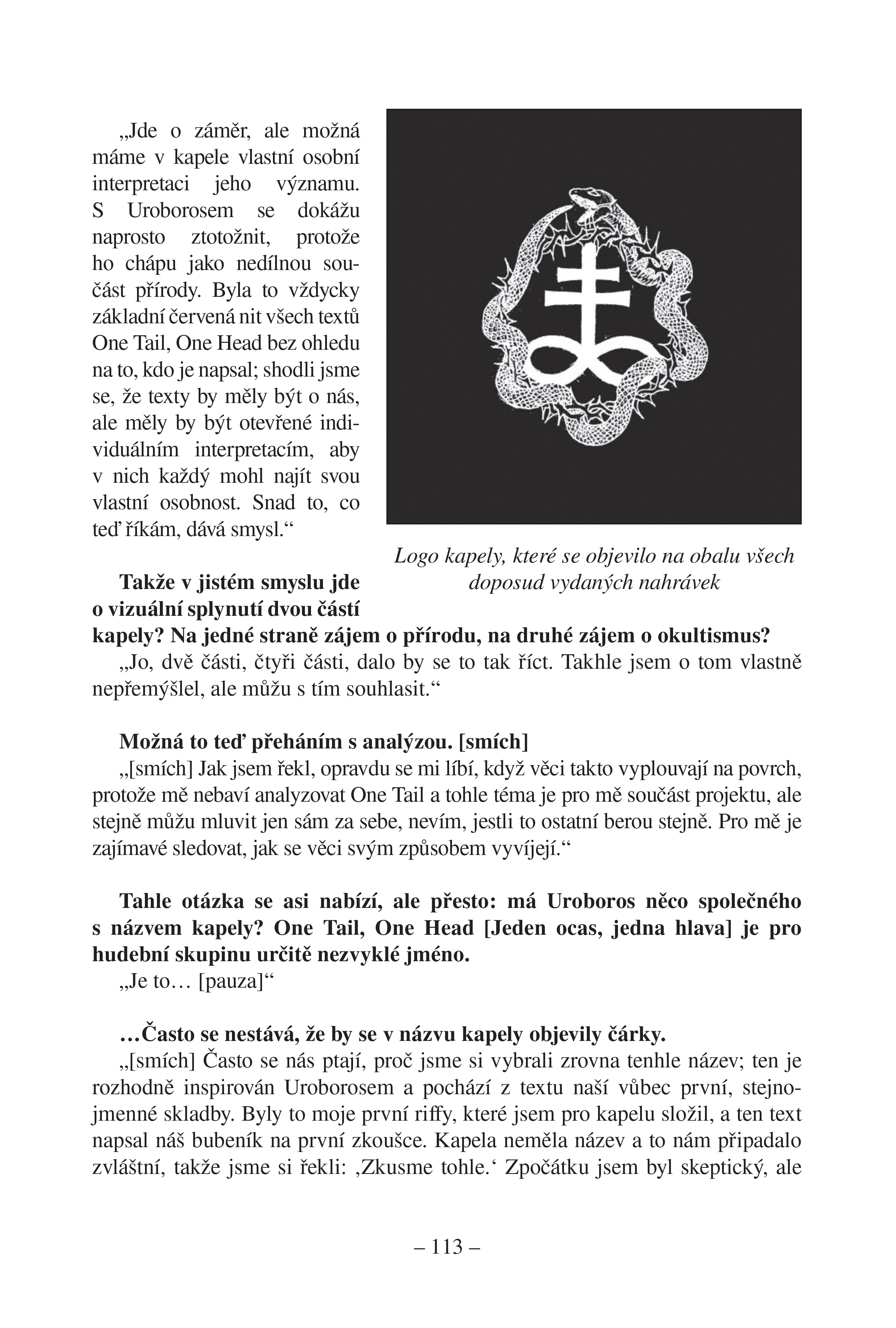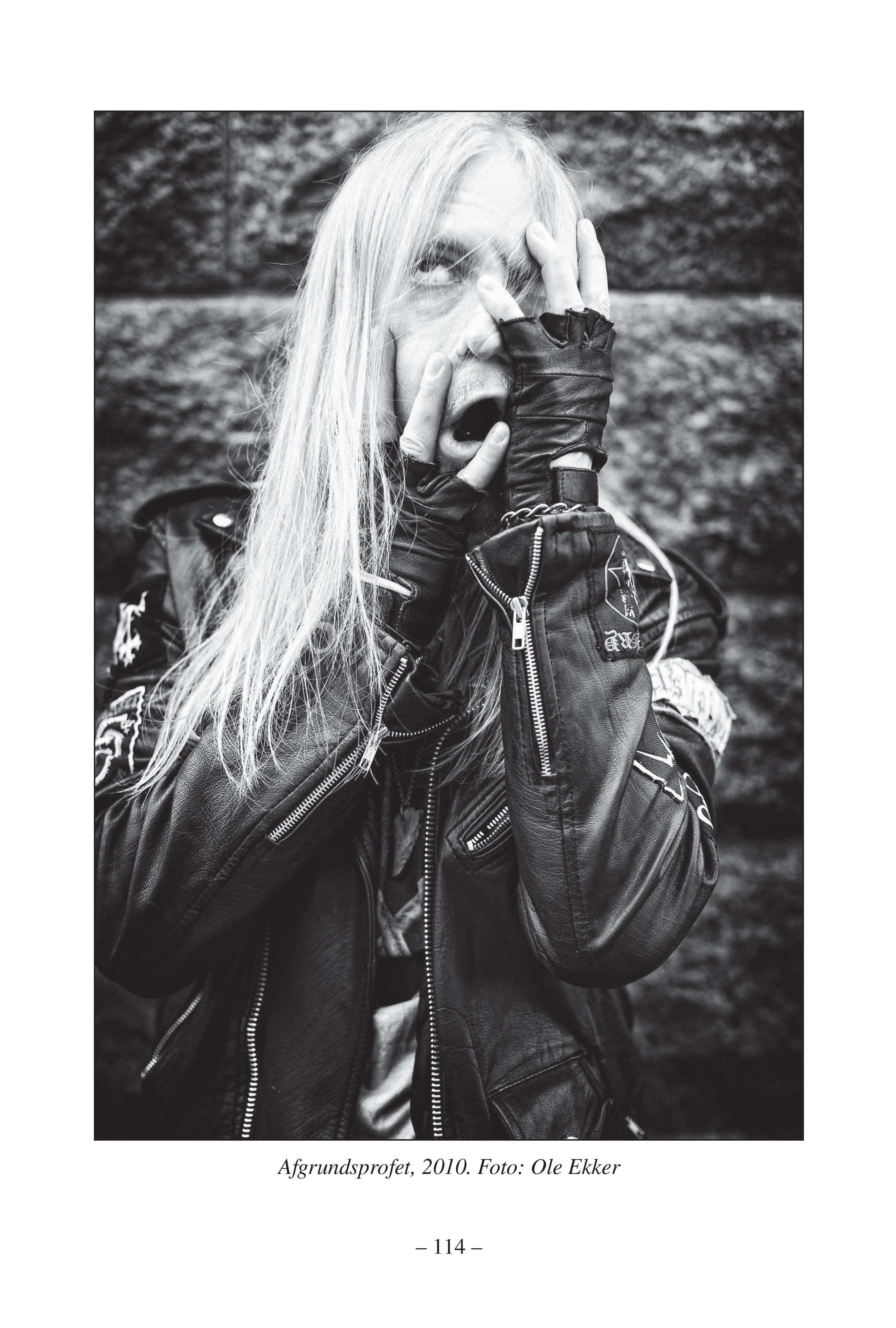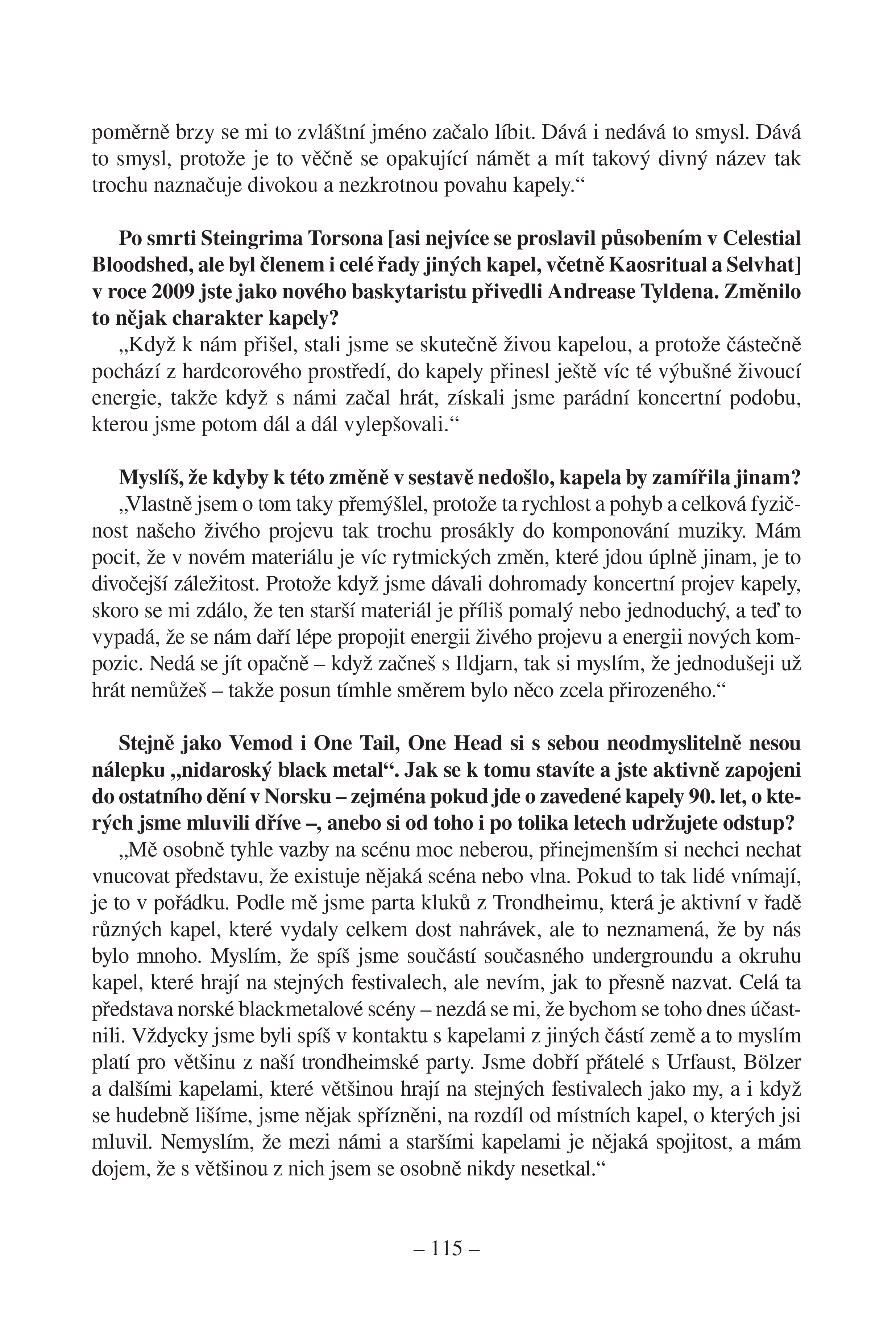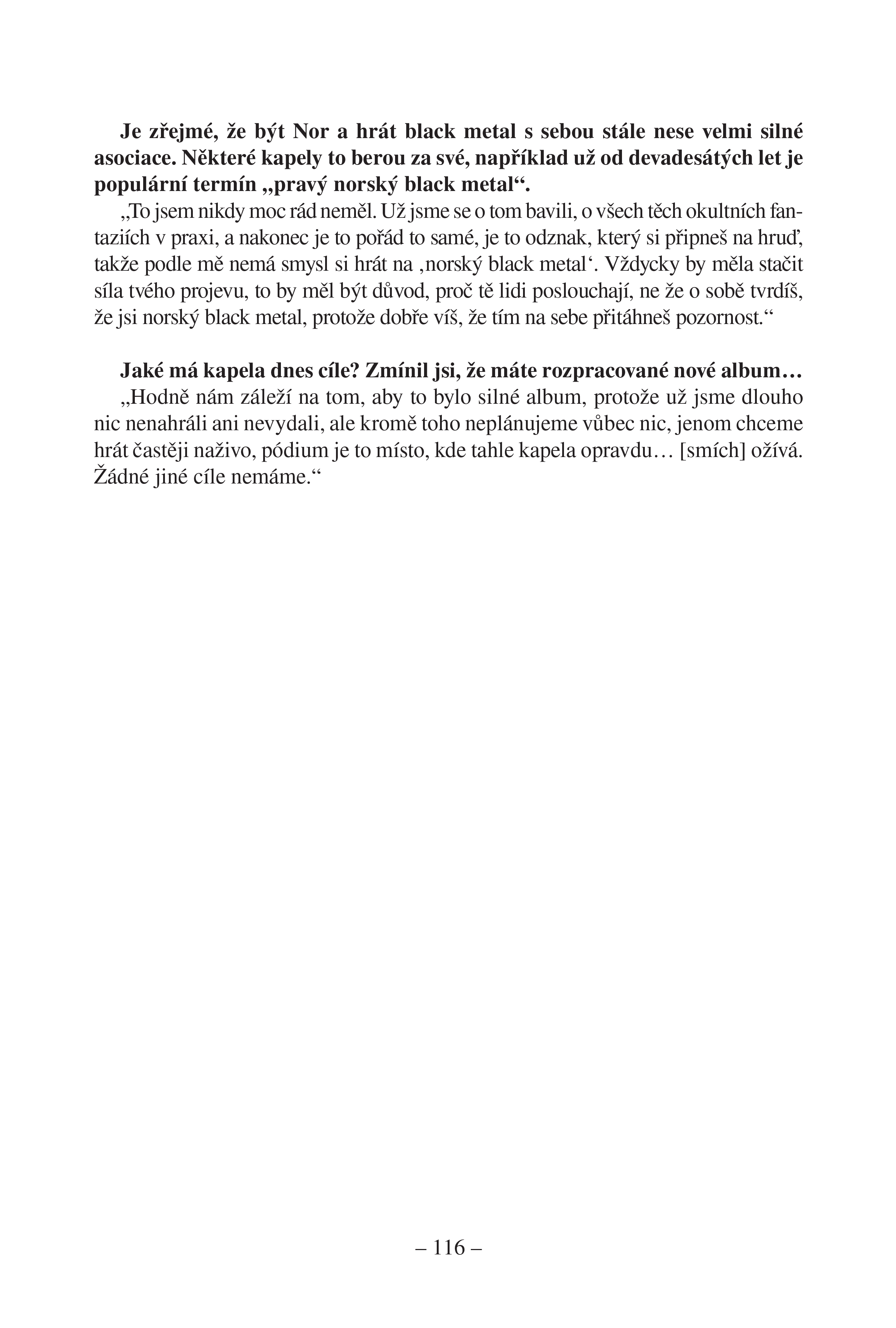Dear friends, the third installment of our coverage regarding the upcoming Czech edition of the fourth volume of the Black Metal series by Dayal Patterson "Into the Abyss". Last time we brough, among other things, a list of all chapters, so today we are following up and presenting you one of those as an excerpt!
The chapter in question is the sixth one, which contains an interview with Jan Even Åslim, guitarist and one of the songwriters of One Tail, One Head, a Norwegian band that belongs among the pillars of a specific undercurrent within the black metal movement that is called Nidrosian Black Metal.
As usual, the whole excerpt is presented as it will appear in the Czech translation when printed. The layout and typesetting is by Radek Doleží (the court visual artist of Forgotten Silence). Click on the individual images to zoom.
The English original text is as follows:
Existing since 2006, the memorably-named One Tail, One Head have built up a considerable following in the black metal underground, especially bearing in mind their pretty minimal recorded output. Issuing a mere two demos in 2008 and two EPs in 2011, the band have nevertheless earned themselves a reputation as a fearsome live band, their often bloodied, painted appearance and frenzied delivery making a considerable impression and standing in stark contrast to, for example, Vemod. Likewise, their bestial and uncompromisingly aggressive material shares few qualities with such bands musically-speaking, the driving percussion, punky riffing and undeniable sense of groove forming a somewhat more grounded expression one only countered by the mesmerisingly ritualistic and zealot-like pronouncements of frontman and vocalist Afgrundsprofet, also an active member of Behexen, Dark Sonority and Mare, and live session bassist for Dødsengel.
Providing drums for the project is Øyvind Sundli, who also plays in Mare, Aptorian Demon, and live with Black Majesty, and whose stage name, an unpronounceable Theban letter, is sadly unavailable for reproduction in our chosen font for this tome. The original bassist for the outfit, Steingrim Torsen (a highly active member of the Nidrosian scene who tragically died in 2009 by a shotgun blast in somewhat mysterious circumstances) was replaced by Andreas Tylden, also known for his work in doom outfit Altaar and previously active in projects such as the hardcore punk band JR Ewing. Completing the line-up is none other than Jan Even Åsli of Vemod (and more), who not only contributes all guitars but is also heavily involved in the songwriting process. It is his explanation of the band’s unusual beginnings that go some way to explaining the sometimes uncharacteristically un-Norwegian sound of the band – albeit one that has early Darkthrone overtones surfacing periodically.
“Initially myself and the drummer wanted to play some very primitive metal, inspired by Ildjarn. I really love that band – the ferocious, feral wildness of it, and really wanted to do something like that. Not copy it – a lot of bands do that – but create something primitive and wild and have that sort of darkness which is also very different to the typical black metal darkness and also very natural in its own kind of way. Ildjarn obviously used a lot of natural imagery but we didn’t go down that route with One Tail; with Vemod I always had an ambition for that direction but with One Tail we didn’t really stake out any particular direction in advance, we just saw where it took us when we rehearsed together and it evolved into this very direct and physical music.”
Despite being from the black metal scene, the work of Ildjarn is often surprisingly comparable to crust punk and One Tail, One Head seems to wander into similar territories, with songs such as ‘The Splendour of the Trident Tyger’ having a definite punk/Motörhead overtone. Apart from Ildjarn, what would you say have been the main musical inspirations for the band?
“That’s really interesting because I never listened to anything like that and I make all the music [laughs]. Maybe I got it subconsciously from someone or somewhere but I never listened much to punk or crust. There was definitely some of the more first wave black metal coming through though; Celtic Frost, Mercyful Fate, Bathory.”
Tom G. Warrior was a big Motörhead fan and Quorthon claimed GBH as a primary influence, so perhaps that’s the link…
“There you go. It comes from somewhere. Maybe I just didn’t go back to the source [laughs]. With One Tail I don’t analyse almost anything, I just see what comes out, so it’s a very different way of making music and it’s really interesting to see what other people see in it because I don’t see it as being an original band in any way. We don’t try to be original – we don’t try to do anything, except perhaps conjuring a certain ferocity and merely do what we feel like there and then.”
Is it liberating to have these two very different vehicles for expression, to be able to approach the genre from two opposite directions?
“In a way I don’t see it as opposites, but yes, there is a certain sense of liberation in having two, or more, very different channels of expression. Of course, there is less space for that uncontrollable ‘let it go’ mentality in Vemod. One Tail is a live band first and foremost, we only have two EPs and have been playing live a lot and letting go is really what drives me in that band. Absu, actually, have been an influence also. Not in a direct musical way – I’m nowhere near the technical abilities of those guys – but for the sheer madness of it.”
Mercyful Fate surprises me a bit I have to admit, that’s not a band I’d have guessed was an inspiration. What would you say you took from them?
“It’s not as if it sounds like Mercyful Fate, but I really like the way they structured their songs. It’s not so typical for that sort of heavy metal and they often divert from the typical way of arranging their songs, and maybe I also like the distinct authenticity they inhabit, which is very inspiring. I think that’s what I take into making music with One Tail and also being fearless with how you put together songs and not getting caught up in traditional structures, which maybe doesn’t show so much in our early work, because it’s super primitive, but may show a bit more on our forthcoming album.”
Mercyful Fate was of course a very occult band, especially for the time – would you say the same for One Tail, One Head? The imagery and live performances certainly seem quite unambiguous, but you’ve said today that you yourself are not from that background and that also surprised me a little.
“I perceive One Tail as very eclectic and open. In One Tail we’re all very different individuals and we all bring very different influences to the band even though I make the music, the imagery you speak of comes from the other guys. But I’m okay with that, that’s part of the concept. I just really want to let go and do it and it doesn’t have to make sense, because if you want to create something with that feral, wild spirit, it doesn’t make sense to create too many rules for oneself. So it’s very eclectic in that way, even if the music isn’t necessarily.”
As well as feeling more organic than Ildjarn – perhaps simply due to the fact that it’s a full band rather than a one-man project – One Tail, One Head also has much more of a sense of madness, or even possession, about it. Is that something that you planned from the beginning or did that come in later?
“It came in later. It also has to be said with the whole Ildjarn thing; that was the beginning of the band and we’ve definitely strayed away from that, although when I make new material for the band I seek out that sort of place where it all started, because it’s a very fruitful place for me creatively and it’s easy to make that sort of music I think and then infuse it with that ‘spirit of madness’ as you put it. For me that madness is probably what I mean by that ‘wild, feral’ thing – you know, when a group of modern, domesticated human beings get together in a band to create a wild spirit, it’s bound to be mad, because they’re not wild any more. So it seems a bit wrong and yeah, we just embrace that. Possession is not something I can relate to.”
I think a lot of that dimension comes in because of the vocals and I’m presuming that vocalist Afgrundsprofet is interested or involved in occult practice? Certainly his other bands seem unambiguously occult-influenced. Does he take care of all the lyrics or do you contribute to those as well?
“For all the songs we released up to now, I didn’t write any of the lyrics, but for the new album I have written all the lyrics, so they’re a bit different. But he can identify with what I write and he can infuse them with his spirit and that’s what you will get in your face when you see it live. The lyrics that I’ve written, they are very much open in the same way that I write for Vemod; this open, suggestive thing which makes it easy for people to accept and appropriate on their own terms.”
One of the most identifiable elements of One Tail, One Head is this image that adorns all of your releases featuring the Sulfur symbol (famously also used by King Diamond) and the ouroboros. It seems very much a statement of intent, a visual manifesto of sorts – is that the intention?
“There is an intention but maybe we in the band have our own personal interpretations of its meaning. I can really relate to the ouroboros, that is something I see as an integral part of nature. That’s always been the number one red thread in all lyrics of One Tail, One Head no matter who wrote them and something we agreed upon that we should be about, but in an open way so everyone can have their own personality in it, if that makes any sense.”
So in a sense it’s a visual amalgamation of the two parts of the band? This interest in nature and an interest in the occult?
“Yeah, two parts, four parts, you could say that. I hadn’t really thought of it in that way, but that works for me.”
Perhaps I’m over-analysing at this point [laughs].
“[Laughing] Well as I said, I really like how things arise like this, because I enjoy not analysing One Tail and that’s part of the project for me, but then I can only speak for myself, I don’t know if the others think of it in the same way. To me it’s interesting to see how things unfold in a way.”
This is probably an obvious question, but did the name come from the ouroboros as well? One Tail, One Head is certainly an unusual name for a band.
“It is… [pauses]”
…You don’t often get commas in a band name.
“[Laughing] We often get asked why we chose that name and it definitely comes from the ouroboros and it comes from the first lyric for the first song ever written, which is the self-titled track. Those were the first riffs I made for the band and our drummer wrote those lyrics for the first rehearsal. We didn’t have a name and it was so strange we thought, ‘Let’s go for that’. I was sceptical at first but quite soon I embraced the weirdness of such a name. It makes sense but at the same time it doesn’t. It makes sense because it’s a reoccurring theme and to have such an odd name sort of points to the unruly nature of the band.”
After the death of Steingrim Torson [perhaps best known for his work in Celestial Bloodshed but also a contributor to a wide array of bands, including Kaosritual and Selvhat] in 2009 you brought Andreas Tylden in as the new bassist. Did that change the character of the band at all?
“We really became a live band when he joined and he comes from a hardcore background partly and so brought even more of this really explosive live energy, so that whole live expression emerged when he entered the band and we’ve just gone further and further into that territory.”
Do you think the band would have moved in a different direction if that line-up change hadn’t taken place?
“I’ve actually thought about that, because the speed and the movement and the very physicality of our live expression sort of bled into the making of the music. I feel like in the new material there are more rhythm changes that are really off, it’s a wilder thing. Because when that live expression came about it felt almost like that older material was too slow or primitive and I feel like we are heading to a place where the live energy and the energy of the material are more closely linked. To go the other direction is not possible – if you start with Ildjarn I think you can’t go more primitive – so to move in that sort of direction was very natural.”
Like Vemod, One Tail, One Head is closely associated with the ‘Nidrosian black metal’ label. How do you feel about that and at this point do you have much to do with the rest of what’s going on in Norway – particularly the more established bands of the 90s we discussed previously– or do you still remain quite isolated from that all these years later?
“Personally, I’m not so much into the scene thing, at least it doesn’t make sense to me to force the idea that there is a scene or a wave. If people see it that way it’s fine. To me we’re a bunch of guys from Trondheim that have made many bands and many releases but we are not many people. I think we have more connection with the current underground and the types of bands that play the same sort of festivals, how to characterise that I don’t know. But this whole idea of a Norwegian black metal scene, I don’t feel we are a part of that right now. We always had more of a connection with bands from other places and that goes for most of us in Trondheim, I think. Urfaust, Bölzer, these bands that play a lot of the same festivals that we do and we’re good friends and even if there isn’t a musical similarity there is some sort of kinship, as opposed to the bands from here you’ve mentioned. I don’t think we have any connection with the older bands and I don’t think I’ve met many of them either.”
Obviously being Norwegian and playing black metal still carries with it some very strong associations. Some bands embrace that, with the ‘true Norwegian black metal’ phrase having remained popular since the 90s, for example.
“I never really liked that. It again almost comes back to what we talked about with all this occult imagery that is put forward, it’s the same thing in the end, it’s a badge you put in front of yourself and to me it doesn’t make sense to play the ‘Norwegian black metal’ card. Again the power of your expression should be enough, it should be why people are attracted to what you’re doing, not because you’re claiming to be Norwegian black metal, because nowadays you know that will attract attention.”
What are the band’s goals at this point? You mentioned that you have a new album in the works...
“We are very keen on making this a strong statement since it’s been a long time since we recorded or released anything, but beyond that there are really no plans except that we will play live more which is where this band really… [laughs] comes alive. There are no more goals.”
So enjoy and more next time!







